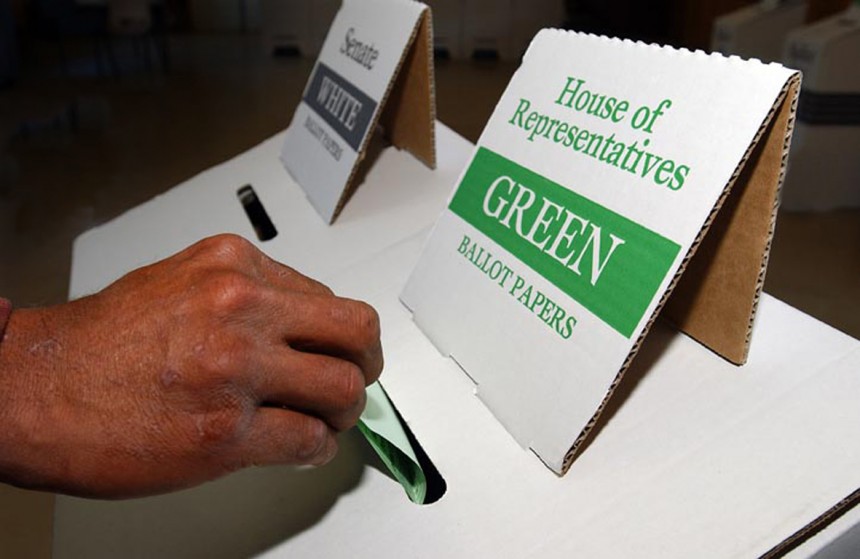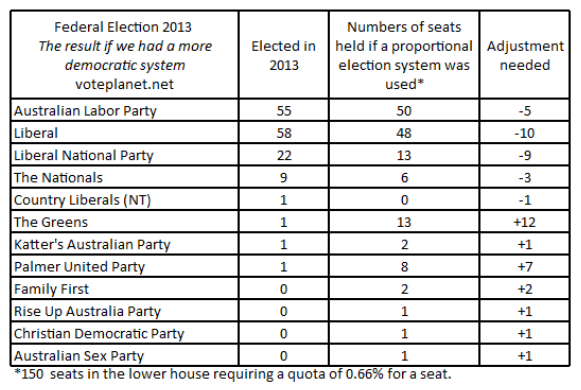|
There is a lot of rubbish being spun in the media around the new Senate reforms. In short the reforms are a reaction by the more established players (Lib/Nats., Labor, Greens and Xenophon) to the success of the micro parties in the Senate. Off course all these players stand to benefit from this change at the expense of the micro parties. The large parties stand to gain by limiting the number of players they have to deal with in the Senate when in Government. The small players (Greens and Xenophon) benefit from becoming the sole voices controlling the balance of power in the Senate. After initially supporting the changes Labor is reversing its bi-partisan stand to play politics in an election year and create an opportunity to differentiate itself from the Liberals and Greens. So let's look at the actual changes. 1. There is no more group voting tickets. You use to be able to simply vote 1 for the party of your choice above the line and your preferences would be allocated according to the whims of your party. Parties big and small used this control of their Senate preferences to make deals. Micro parties realised under the guidance of Glenn Druery that if they swapped their preferences with each other they could help each other get elected. This practice will end under these proposed changes so micro parties and major parties will now have to get pieces of paper in people's hands to tell them how to vote. Major parties and the Greens will be the only parties who can staff most of the booths across the nation unless there is another big spending Clive Palmer-type character: bad for micro parties, more power to major parties and the Greens, and very bad for Glenn Druery who organised the micro parties to work together. 2. People are asked to vote for at least six candidates above the line. This is a good change and means it is much more easy to give your preferences to the parties of your choice rather than having to number every box under the line and risk an informal vote. Also you don't have to stop at six, you can number more but it does mean you DON'T have to give your preferences to parties you don't want to and can stop your preference flow whenever you want to (more on this issue below). 3. A single 1 above the line is still a vote. Even a single tick or cross is a valid vote. This means that people unfamiliar with our voting system or who might have difficulty reading or understanding the instructions properly can still have their votes counted even if they make mistakes. You can even cast a valid vote for less than 6 parties i.e. 1 and 2 or 1,2,3,4 for example and the vote will still be counted. 4. Limiting the number of parties a person can register. This is a plan to stop the same people setting up and running dummy parties. It should be noted that each party registered has to have different members so in limiting the number of parties a single person can register will have really no effect as most dummy parties will simple find a different person willing to be the registered officer. Having multiple smaller parties under the other changes specifically “no group tickets” means you really have no or little advantage running multiple parties. An unnecessary change targeted at a specific senator. 5. Party Logos. Great to have a logo. This will help people know who they are voting for. Do these changes affect Save the Planet? No. Save the Planet doesn’t make preference deals and we were unlikely to benefit from preference flows. We might be the only party in Australia that doesn't do preference deals. Save the Planet simply gives our preferences to the parties and candidates with the strongest climate policy first, putting those with really bad policy last, while also holding sitting members to account for the action or lack of action on tackling global warming. We don’t deal but will happily explain to parties how to improve their climate policy. Do I support the changes? Yes I do, but my problem is with the framing of the reasons for the change. Instead of being honest and saying “we are changing the system because it no longer provides us with the power it use to and we want to remove almost any chance a micro party has of getting into the Senate so we can control the Senate more easily”, people such as The Greens' leader Richard De Natalie and Senator Nick Xenophon have been harping on about some miscarriage of justice claiming that voters who support micro parties end up with micro parties on the other side of the political spectrum. Yes, this can happen sometimes but voters of micro parties know this and realise that the ONLY hope of getting their representatives elected in an undemocratic system dominated by a handful of major parties is swapping votes with other micro parties. Micro parties are also not stupid. They first seek to support like-minded micro parties' chances of getting elected before giving their preferences to non-like-minded parties. Those people who vote for micro parties but don't support this style of preference swapping can and do simply vote below the line and have full control of their own preferences. However, it's not just micro party preferences that can end up on the opposite side of the political spectrum. Major political parties such as the Greens and Labor also make preference deals that go against their stated political ideology in an effort to win an extra seat or two or keep perceived threats out. These deals have produced results such as the election of Family First Victorian Senator Steven Fielding in 2004 who got a primary vote of 1.76% compared to the Greens David Risstrom's 7.76%. After the major parties took the first 5 Senate seats Family First and Greens got preferences from smaller parties as they got knocked out. Before the final distribution, Family First had 309,117 votes and the Greens 305,083 votes. The resulted was decided by over 230,000 preferences transferring from Labor to Family First. If Labor had given their preferences to the Greens ahead of Family First on their group ticket, the Greens would have won instead. This was a really bad decision by Labor as it resulted in all sorts of outcomes that were against Labor policy and prevented an excellent Green candidate from getting elected. The Greens have also made some strange preference decisions choosing to “put coal miner Clive Palmer’s party (PUP) and Bob Katter’s party ahead of Nick’s [Xenophon] running mate Stirling Griff” in 2013 (http://www.nickxenophon.com.au/media/releases/show/parties-preference-deals-show-strange-bedfellows/). Another misconception is that people got elected on tiny votes, for example Virginia Trioli on ABC24 speaking to Glenn Lazarus today (7.38am 23/2/16). However the fact is every Senator elected is there because they got a full quota of either 1st preference votes and / or preferences from other parties. Some Labor and Liberal senators also get elected by a very small number of primary votes AND the preferences from other parties. Do we hear calls to stop this happening? No, only in relation to the micro parties. Will the voting reforms stop major parties doing these dodgy deals? Yes and No. With abolishment of “group voting tickets” where parties submit a list of preferences that is used by the AEC to determine the preference flow for every voter who voted “1” above the line for that party it has now become very difficult for parties to control the Senate preferences of their voters unless they can adequately staff the vast majority of voting booths across Australia and afford to print out 100,000's of how to vote cards. Not surprisingly the only parties who can do this are the major parties, Lib/Nats, Labor and the Greens and perhaps ultra rich individuals such as Clive Palmer. Micro parties will have no chance of doing this and even if they could, the likelihood of for example a Family First voter wanting their preferences to go to the Sex Party prior to the Liberals or Nationals would be very low and the voter would most likely not follow their party card if they read and understood it. Likewise it will probably mean Labor won't be able to get away with preferencing Family First ahead of the Greens as this would annoy many of their voters and probably get the Greens an extra 1% on first preferences as voters leave Labor in disgust. Has it made our system more democratic. Yes and no. Firstly a yes and most importantly we are now encouraged to control our own preferences flow by numbering at least six boxes. We are likely to see a jump in the number of people controlling their preference now you can do this without voting below the line. However most people don't understand the voting systems and the vast majority will simply vote accord to the cards they are given. A second 'yes' is we can stop the flow of our preferences at any time. I personally find systems that force you to vote for all candidates on a ballot very undemocratic, it's sort of like voting for a one-party system where you can vote but there is no point. Here we have effectively two parties Lib/Nats and Labor in our lower house unless you live in a seat with a strong independent or strong Green. I personally don't want to vote for either Nat/Libs or Labor as they are both corrupt and accelerating global warming by approving coal and gas developments around Australia and refuse to take the issue seriously. If being able to stop preference flows is good for the Senate why can't we stop our preference flows in the lower house? We use to be able to stop our preference flows in lower house by simply repeating a number on the ballot such as numbering the ballot 1,2,3, 4, 4. In this example only the first three preferences would be counted. This type of voting got the nickname a “Langer Vote” after a person who spent a lot of effort promoting it. As more people became disillusioned with major parties and more and more people stopped voting for them, the major parties faced the real problem, which was that some seats had a chance of the leading candidate getting less than 50% of the preferences once it was down to the final two candidates, as well as a growing message that the major parties were not worth a vote. Of course the major parties combined in 1998 to make this system of voting invalid so your vote didn't count. It is interesting to note how the major parties are happy to allow two types of preference voting in the different houses if it helps them retain power, an example of how corrupt our system is. So why has it made our system less democratic? Well minor and micro parties combined do get quite a large vote but they are under-represented in parliament in terms of the number of seats they hold compared to the proportion of their vote. The old Senate voting system was one way that the minor parties did get people elected and hence in away made our parliament more representative of people's actual votes for the parties they wanted. To me it's much more concerning that we have an unrepresentative lower house, than a Senate with some micro parties swapping votes to make sure they get a seat, but we don't hear people talking about this issue. Could we solve this undemocratic problem in the lower house? Yes. We simply double the size of the Federal electorates allowing 75 seats that are no longer linked to a specific location to be distributed to parties who are under represented in parliament once the results for the 75 area based seats are calculated. The threshold for a seat in this system is only 0.66% of the national vote. Some countries such as New Zealand use this type of system. It would also mean that both side of politics would most likely have to form coalitions to form Government, and not just the Liberals and Nationals, so in future we might see Labor / Green coalitions and other combinations if this system was adopted. This table shows the number of lower house seats the different parties should have got in the 2013 Federal parliament if we had a democratic system based on proportional representation. It shows major parties would be much less represented while many more minor and micro parties would have more representation. TABLE 1. 2013 Federal Election results: Actual vs Proportional (rounded)
7 Comments
|
AuthorsBloggers on this page include Adrian Whitehead, Philip Sutton, Bryony Edwards, Andrea Otto, David Lughermo. Categories
All
Archives
July 2022
|


 RSS Feed
RSS Feed
